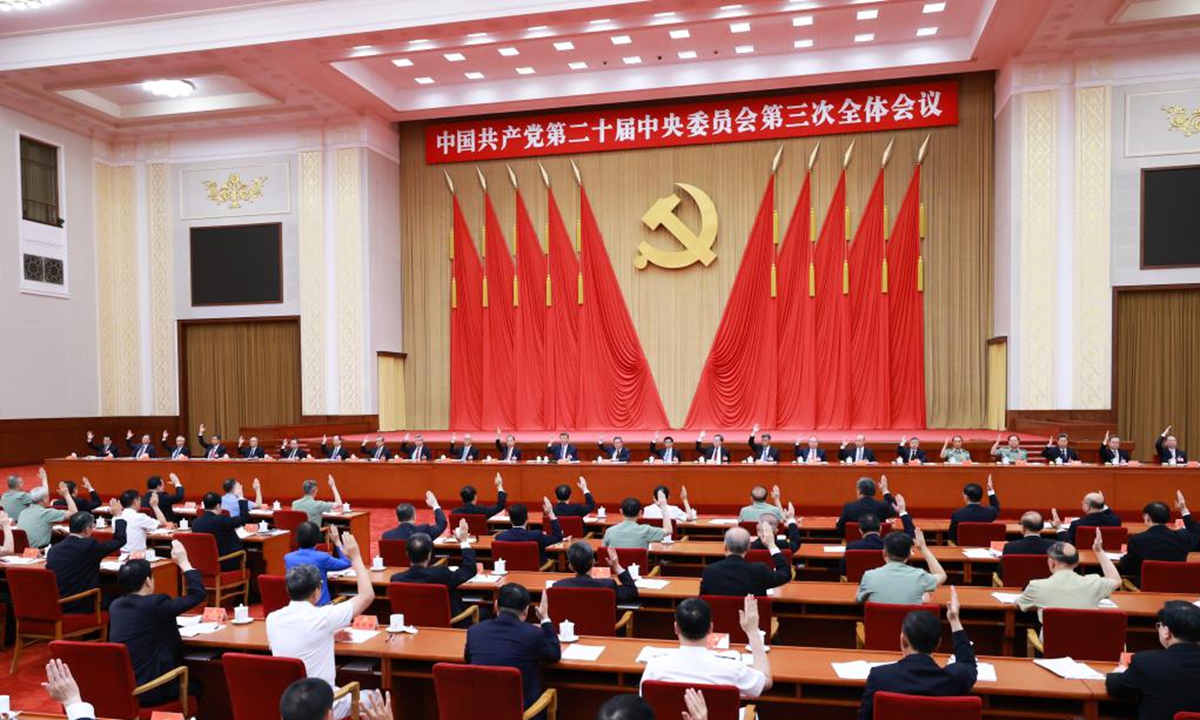Third plenum ‘injects fresh growth momentum’
Blueprint for comprehensively deepening reform released

Three combine harvesters rush to harvest early rice before the coming of a typhoon in a village in Wenling, Zhejiang on July 22. Photo:VCG
China has demonstrated its determination to comprehensively deepen reforms, with policy stability and continuity a highlight, Chinese and foreign experts said on Monday, commenting on a resolution on further deepening reform comprehensively to advance Chinese modernization that was adopted at the just-concluded third plenary session of the 20th Communist Party of China (CPC) Central Committee.
A detailed version of the resolution was published on Sunday by the Xinhua News Agency. The adoption of a reform resolution is the most important outcome of the third plenum, which was held in Beijing last week.
The 60-point document's publication reiterated that markets will play a decisive role in resource allocation, and noted that the government will work on legislation to improve conditions for the private sector. It further detailed plans to forge new productive forces, promote revolutionary breakthroughs in technology, innovative allocation of production factors, and in-depth industrial transformation and upgrading.
The document also highlighted the resolve to further fiscal and financial reforms, boosting affordable housing, implementing employment-first policy, and improving job opportunities for young people and the standard of living for the elderly.
Amid a world that is undergoing unprecedented changes, observers said the blueprint on further deepening reform will guide efforts in tapping the potential of the world's second-largest economy, offer a sense of continuity and certainty, and inject fresh growth momentum into global economic growth.
Su Jian, professor of the School of Economics, and director of the National Center for Economic Research with Peking University, highlighted the resolution's noteworthy all-encompassing strategic design, noting that it outlined comprehensive reform guidelines across various key areas including the economy, legal system, culture, education, and others for advancing Chinese modernization.
"It is expected to bolster public confidence and fuel economic growth if proactive and correct follow-up actions are implemented promptly and effectively," Su said, adding that the reform goals will be achieved, given the CPC's leadership's determination.
Su called for establishing clear expectations for public sentiment and economic performance through specific measures to ensure the successful implementation of these policies.
Looking ahead, Su expected the advancement of new quality productive forces driven by technological innovation to provide continuous impetus to the economy's healthy and sound growth in the latter half of the year.
Tapping the economy's potential
As the Chinese economy enters a critical period of transformation, observers said the blueprint published on Sunday will further tap the potential of the Chinese economy through institutional reforms such as intensifying efforts in building a unified national market and fostering the market economy to ensure prosperity in the next five to 10 years and beyond.
Lian Ping, director of the China Chief Economist Forum, told the Global Times that such a sweeping reform agenda aims to address long-standing issues that have hindered China's development, in a bid to facilitate industrial upgrades and sustainable economic growth and further unleash the economy's potential.
"The reform blueprint outlined in the resolution proposes tailored measures across multiple domains, providing clear guidance for the continuous resolution," Lian said, highlighting these actions' role in enhancing China's institutional framework and advancing its modernization efforts, which will determine China's economic trajectory over the next decade and beyond.
Lian noted that given China's vast market, the reforms are poised to substantially boost market dynamism and consumer spending, which will benefit global economies. He called for the extensive reforms to be viewed with optimism, as they are expected to provide a favorable environment and conditions for global economic growth. "The stupendous efforts made in drawing the reform blueprints are certainly not aimed at weakening the economy; it aims to help it grow."
"China's longstanding policy of promoting reform through opening-up has been proven successful, with recent sweeping facilitating measures presenting the country's firm commitment to opening wider to the world," Su said, expecting that the newly released reform blueprint will foster trust and confidence both at home and abroad as global investors' concerns over China's opening-up process are often rooted in their lack of understanding of the reality in China.
"Steadily expanding institutional opening-up will be a breakthrough for the new round of reform and opening-up. To this purpose, efforts are needed to boost opening-up with regard to rules, regulations, management and standards, while institutional innovations should also make improvements," Wei Jianguo, former Chinese vice minister of commerce and executive deputy director of the China Center for International Economic Exchanges, told the Global Times on Monday.
Wei highlighted that the resolution, for the first time in history, proposed further reform on the management systems for both inward and outward investment, underlying China's commitment to build a market-oriented, rule-of-law and international business environment to protect the rights and interests of foreign-funded enterprises.
Major boon to world
With China poised to continue pursuing the building up of an open economy and fostering modernization with innovation-driven growth, and sharing its growth dividend with the rest of the world, analysts highlighted the blueprint as being a major boon to the world.
Over the past decade, China has made a batch of key sci-tech achievements, embodying China's rapidly-growing innovation capacity and its contribution to the world's sci-tech development, Wan Zhe, an economist and professor at the Belt and Road School of Beijing Normal University, told the Global Times on Monday.
China's development of new quality productive forces involves both sci-tech innovations and transformation of traditional industries. As the "world's factory," China's industrial transformation and upgrade is significant for the world as it will inject new growth energy into the global economy in terms of digitalization, smart technologies and green development, Wan said.
"As promoted in the third plenum, China will focus on high-quality development, and deepen its supply-side structural reform to create new drivers and strengths for realizing growth. With these all-new positive developments, China will achieve its GDP goal of around 5 percent and that will create fresh opportunities for the world, injecting confidence and impetus into global economic recovery," Maya Majueran, director of Belt & Road Initiative Sri Lanka, told the Global Times on Monday.
According to Majueran, this plenum was "made very unique" by the raising to international prominence of the Global South with China's willingness to take a leading role in global governance against the backdrop of the fast-changing geopolitical landscape, intensified global economic and financial fragmentation and a shift in trade and cross-border investment flows.
"China's economic miracle inspires many developing countries to adopt similar policies and approaches. Therefore, China's plans for further deepening reform will further encourage other countries to follow China's development paths and systems to achieve inclusive economic growth and development, and to support common development and prosperity for all countries in the global village," said Majueran.
Expanding high-level opening-up is one of the key highlights of the just concluded third plenary session, Foreign Ministry spokesperson Mao Ning told a routine press briefing on Monday.
"China will more actively integrate into the global economy, promote Chinese modernization through deepening comprehensive reform and promote high-level opening-up, and push for the realization of global modernization featuring peace and development, mutually beneficial cooperation and common prosperity," Mao said.



